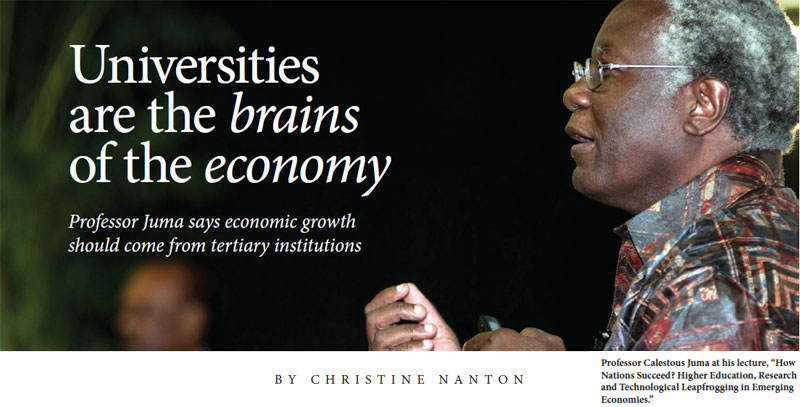|
December 2013

Issue Home >>
|

Professor Calestous Juma first visited Trinidad in 2001, and the following year, he visited The UWI. The changes from then, especially visible in the infrastructure, struck him, as he also observed the expansion of tertiary education.
Juma, Professor of the Practice of International Development and Director of the Science, Technology, and Globalization Project at the Harvard Kennedy School, was again at the St Augustine campus in November, this time at the invitation of a cluster of tertiary education bodies: The UWI, CARISCIENCE, the University of the Southern Caribbean (USC) and the University of Trinidad and Tobago (UTT).
His Distinguished Open Lecture, “How Nations Succeed? Higher Education, Research and Technological Leapfrogging in Emerging Economies,” focussed on the importance of investment in higher education research; diversification of the economy through genomics and nanotechnology; and leapfrogging to accelerate national development.
Tertiary education’s expansion is key towards building an innovation-based economy, he says, and universities play a large role in this development. Universities are shifting towards a more entrepreneurial role and are thus repositioning themselves in national economies. He cited the Cocoa Research Centre’s work in genomics, under the leadership of Professor Pathmanathan Umaharan, as a striking example of how successful such a shift can be. The CRC has been doing internationally acclaimed work in the sequencing of the cocoa genome.
For Trinidad and Tobago, he saw the agricultural sector as one that represents an enormous opportunity for technological growth.
Professor Juma said universities now see themselves as engines of economic development, and that should be welcomed. The next step should be that institutions support the creation of enterprise so universities can function as incubators. A student’s time on campus could be spent towards the creation of new businesses so that when they graduate, they use their university experience as an opportunity to create their careers and build their future.
At his lecture, Professor Juma described how he helped the Sultanate of Oman, an Arab state, create its National Research Council. An important aspect was using some of the oil and gas revenue to create a research fund. That fund would then be used to develop new technology into products, goods, services and enterprise. Oman’s National Research Council, which focuses on helping the country diversify through technology, is funded by their oil and gas revenue research.
Much of Professor Juma’s work is centred on the dynamic role of technological innovation in economic transformation. New knowledge, he believes, is embedded. Economies grow over time and as they grow, they learn to do things differently. He compared economies to human beings—as we grow in age, we gain knowledge and are able to do more; our knowledge becomes more sophisticated and more diversified. For him, the measure of economic growth lies in diversification. Universities, therefore, are the brains of the economies, as they are the centres from which high levels of knowledge emanate.
Professor Juma noted that a strategic direction for a nation, particularly in a democracy like ours, should form part of the political platform for any party seriously interested in governance. This strategy should focus on innovation for economic development. If innovation does not form part of the strategic vision, he believes that governments often become confused on what direction to follow. As a result, they are not committed to the development of any one initiative long enough for it to create the necessary impact. While they may remain in office, they often have very little to show for their performance during their term. It therefore becomes harder to govern, because what takes place is the absence of a mechanism to rally the population around a few specific industries.
He defined leapfrogging as the seamless movement to the adoption of a new technological system, citing the movement from landline to mobile phones—as mobiles became cheaper and more readily available, there was an almost seamless movement towards their use. He believes the challenge for Trinidad and Tobago lies in identifying the sectors where the same type of leapfrogging can occur, as has been the case with telecommunications.
He identified the movement to online learning in higher education, whereby students have access to large quantities of content, as one such area. In many online systems, the programme is reversed and students pay attention to lectures online and then are able to explore their own interpretation of the information in the classroom. This is referred to as the “flipped classroom.” Students come to the classrooms equipped because they have already listened to the lecture on their own time and it is now the lecturer’s job to facilitate discussions with a wider pool of readily available information and student knowledge in the subject area.
Professor Juma spoke of the need for a movement in our educational systems, focussing more on learning as opposed to teaching and empowering students to use the available pool of information to solve problems in real life situations. Teachers help students to “learn how to learn” and empower them, as opposed to pumping information into them. Teachers are responsible for showing students how to improve their learning skills.
Professor Juma, who has won several international awards for his work on sustainable development, is currently Faculty Chair for Innovation for the Economic Development Executive Program and directs the Harvard Kennedy School’s Agricultural Innovation Policy in Africa Project, funded by the Bill and Melinda Gates Foundation. He is a former Executive Secretary of the UN Convention on Biological Diversity and Founding Director of the African Centre for Technology Studies in Nairobi. He is co-chair of the African Union’s High-Level Panel on Science, Technology and Innovation and a jury member of the Queen Elizabeth Prize for Engineering. Professor Juma is former Chancellor of the University of Guyana. His latest book, The New Harvest: Agricultural Innovation in Africa was published by Oxford University Press in 2011 and he is currently writing books on engineering for development and resistance to new technologies. |





